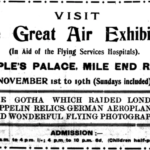
The ostensible purpose of the Air Services Exhibition was to raise money for ‘the FLYING SERVICES HOSPITALS’ and ‘VISCOUNT FRENCH’S WAR CHARITIES’, as you can see in the poster above. But those laudable aims didn’t mean it wasn’t also propaganda (as you can also see in the poster above). And, despite the name of the exhibition, it wasn’t about the RFC and RNAS generally, but about the air defence of Britain. Not only did the exhibits consist largely of Zeppelin destroyers and destroyed Zeppelins (and Gothas), but two senior members of Britain’s military aviation establishment gave speeches at the opening of the exhibition on 1 November 1917, which as it happened was the morning after a Gotha raid on London, Kent and Essex. Unsurprisingly, they both spoke on the topic of air defence.
The first (presumably) speaker was Lord Cowdray (Weetman Pearson, as in Pearson plc), President of the Air Board. The Air Board was the last iteration of Britain’s experimentation with political oversight of military aviation before settling on a fully-fledged Air Ministry. Indeed, by the end of the month Cowdray had resigned his post (not quite amicably: he had not been informed by Lloyd George that he wasn’t going to get the new job of, effectively, Air Minister, and only found out because the preferred candidate, Lord Northcliffe, very publicly turned it down). The reason for the administrative changes, at least in part, was the failure of London’s air defences to prevent the Gothas from getting through, and this was the topic of the second (presumably), General E.B. Ashmore, commander since August of the London Air Defence Area (LADA). Together, Cowdray and Ashmore were in charge of making British aircraft and destroying German ones, respectively.
Cowdray’s theme was the need to stay the course. He boasted that his department was churning out ‘as many machines as possible of the best types’ for ‘the naval, military, and air services’ (which last may be a hint about the forthcoming formation of the RAF) ‘at an ever-increasing rate’, but, evidently realising that his listeners might wonder why, then, London wasn’t better defended, chose to sidestep the question entirely. While admitting that ‘Last night […] was an appalling night to many of the residents of Greater London’, he nevertheless argued that
we have to realise that the dangers of London and the momentary inconvenience and strain that these raids involve are nothing compared to the demands that are being made upon the Navy, Army, and Air Service.
‘We should be playing the Hun game’, Cowdray told his audience, if they allowed the raids ‘to affect in any way our nerves or our morale’, because ‘That is what the Germans are after’. He claimed not to ‘know an Englishman who is afraid of warfare of this kind’, adding that the government was ‘determined that the Germans will have to pay in numbers, in deaths, and in money eventually for all the damage and injury they are doing just now’.((Leicester Daily Post, 2 November 1917, 1.))
Ashmore took a different tack to his political superior (if not actual master), saying that ‘for air purposes London was as much in the battle-front as any town on the Continent’. He also praised the work of the RFC’s home defence squadrons:
Lord French had made certain arrangements the effect of which was that of the German machines, Zeppelins or aeroplanes, which came over nine-tenths failed to attain their objective. That was something to have achieved.
Nevertheless, even if ‘they had all the guns, machines, and lights in the world’, it still would not be possible to ‘make absolutely certain that no German machine would attack London’. All they could do was make it as hard as possible, and Ashmore in fact could point to the late raid as evidence that this strategy was working:
Wednesday night’s aeroplane attack was made in seven waves… All the attacks were driven off by the barrage and other arrangements. In the seventh attack two, or at the most three, got through and dropped bombs. The effect of the raid was, owing to the defences, extraordinarily small compared with the all the efforts that the Germans put forward.
He wryly, if surprisingly darkly, given the public occasion, suggested that ‘it would not be altogether politic to hang us every time a bomb is dropped on London’ (an image he was to return to after the war):
You would have to do a lot of hanging, and I don’t know that you would be much better off after you had hanged us all.((Courier (Dundee), 2 November 1917, 3.))
I’m not sure how these speeches were taken. Cowdray was asking Londoners to keep taking it, on the promise that Germany would pay in ‘numbers’ (aircraft), ‘deaths’ (reprisals?), ‘money’ (reparations), but without being able to say when. Ashmore was more positive. He was right to say that London’s air defences were now more efficient and were making things more difficult for the raiders. But he was also a little fortunate in his timing — while the 31 October raid was a disappointment, even a fiasco, for the Germans, there were to be more appalling nights for Londoners over the coming winter.
Image source: Imperial War Museum.
![]() This work is licensed under a Creative Commons Attribution-NonCommercial-NoDerivatives 4.0 International License.
Permissions beyond the scope of this license may be available at http://airminded.org/copyright/.
This work is licensed under a Creative Commons Attribution-NonCommercial-NoDerivatives 4.0 International License.
Permissions beyond the scope of this license may be available at http://airminded.org/copyright/.




“Nevertheless, even if ‘they had all the guns, machines, and lights in the world’, it still would not be possible to ‘make absolutely certain that no German machine would attack London’.”
One might even say that the Zeppelin will always get through…
You might very well say that; I couldn’t possibly comment.